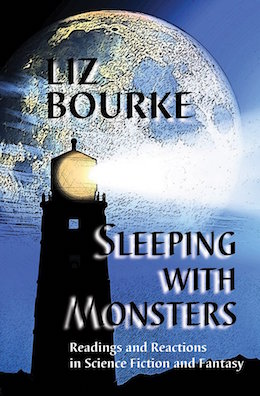A collection of my assorted nonfiction, Sleeping With Monsters: Readings and Reactions in Science Fiction and Fantasy, is about to hit bookshelves and electronic retailers this July. It’s being published by Aqueduct Press, but—as the title implies—much of the material is based on my “Sleeps With Monsters” column here.
Today I’m here to try to convince you to read my book! Or at any rate, to read things that might surprise you.
Writing “Sleeps With Monsters” for Tor.com has shaped basically shaped my career as a critic. Week to week and month to month, I learned more about the science fiction and fantasy genre as I wrote on it—and as I stuck my foot in my mouth, on occasion. I’ve always tried to focus on women’s writing, and as I learned more, I tried to expand my knowledge of the writing of people who experience multiple marginalisations. (I don’t know that I’ve always quite succeeded!)
Learning to read critically is an interesting process. You find you can’t turn it off unless you try really hard: you’re always paying attention to what kind of work the narrative is doing, and what sort of thing it’s setting itself up to be. You learn to recognise what particular works are interested in, and the shape of the story they’re telling. In many cases, you can tell what sort of book any given volume’s going to be—good, bad, indifferent, actively offensive; whodunnit or military-focused or romance or thriller or coming of age—within the first few pages.
You’re always making mental notes and looking at comparisons, and looking at the way that sometimes comparisons fall short: nothing is ever exactly like anything else, but the elements that any given works have in common can be very revealing. C.J. Cherryh’s Foreigner series shares almost nothing in common with Becky Chambers’ The Long Way to a Small Angry Planet, but they are both concerned to some degree with domesticities and with relationships between people who are alien to each other, relationships across cultures that extend beyond romantic or sexual relationships. (Though Cherryh is far more concerned with cross-cultural politics.)
There are always layers in a book. The complex—at least, when it is complex, and not marginally competent dreck—interplay between plot and theme, worldbuilding and characterisation is really fun to tease out, to admire it if it all (or at least mostly) comes together in support of the same ends, and to shake your head at it if parts of it sit at odds. To take an example: Say you have a story whose plot involves finding justice for a murder, but in order to bring the perpetrator to justice, the main character commits a few murders themselves, and the narrative doesn’t do anything to acknowledge that this is, at the very least, dubious as all get out as a moral choice. Maybe you missed something. Or maybe it’s just not there.
If it’s not there for you, that doesn’t mean someone else won’t see it: but this fundamental subjectivity in the experience of reading does mean that every piece of criticism is as much about the critic as it is about the work.
As much as. We all bring pieces of ourselves to our reading. But the book remains an object created by someone else, received by the reader. Reading is an act, almost, of translation.
(…which makes criticism really a rather recursive past-time, come to think: the reader-critic and the critic-reader, the writer-critic and the critic-writer.)
Which brings me to Sleeping With Monsters. It’s a journey through the science fiction and fantasy where I learned—as much as I could be said to have learned, and not still be learning—to read and write critically. It’s a journey through science fiction and fantasy with a lot of yelling about the politics of representation.
It’s a journey through reading.
So whether you read it or not, I hope you go read things that startle and delight you, that open your eyes and fill up your heart.
Because I did, and I am.
Sleeping With Monsters publishes July 1st with Aqueduct Press.
Read the introduction to the collection, written by Kate Elliott, here on Tor.com.
Liz Bourke is a cranky queer person who reads books. She holds a Ph.D in Classics from Trinity College, Dublin. Her first book, Sleeping With Monsters, a collection of reviews and criticism, is published by Aqueduct Press this year. Find her at her blog, where she’s been known to talk about even more books thanks to her Patreon supporters. Or find her at her Twitter. She supports the work of the Irish Refugee Council and the Abortion Rights Campaign.










